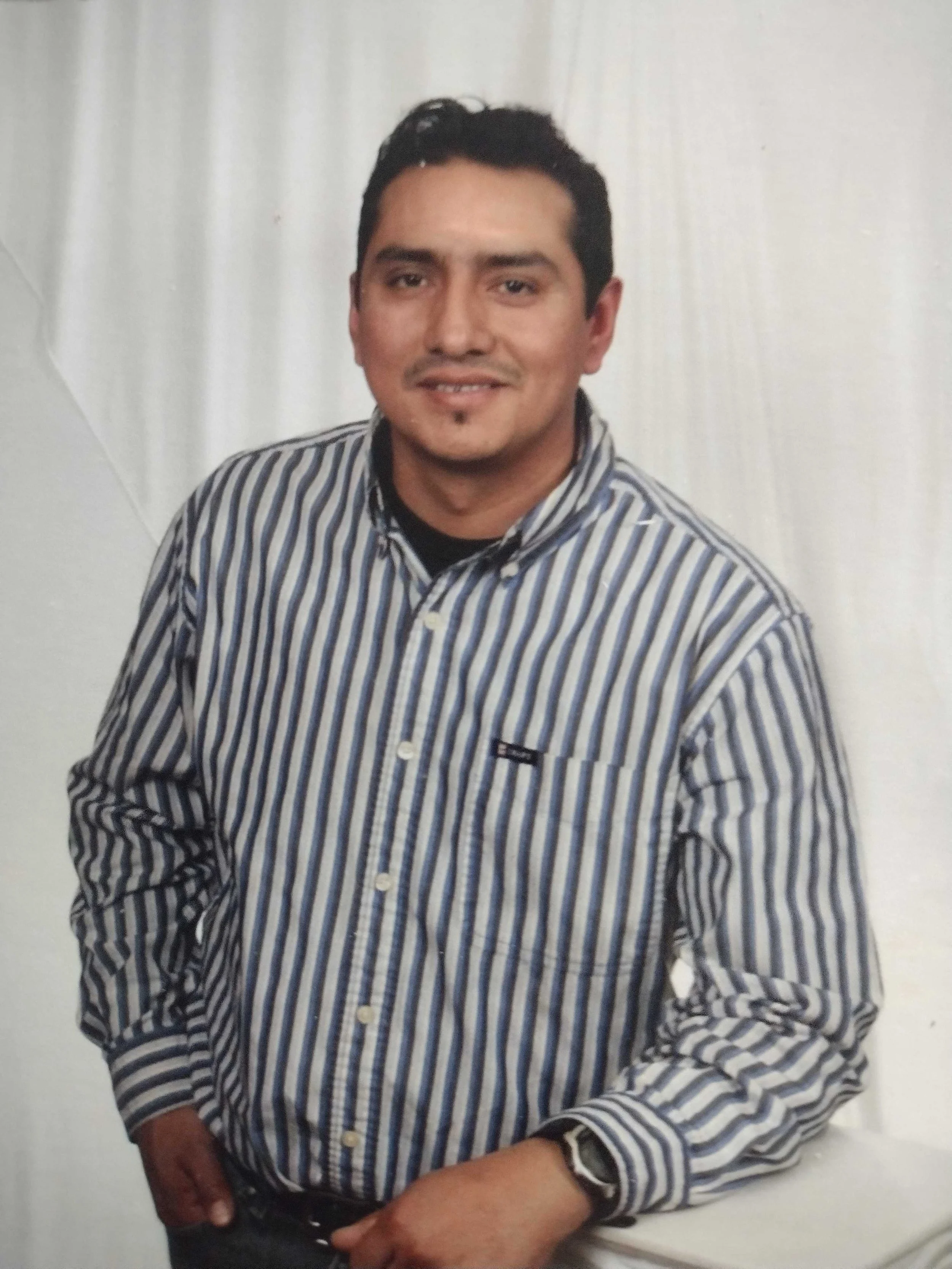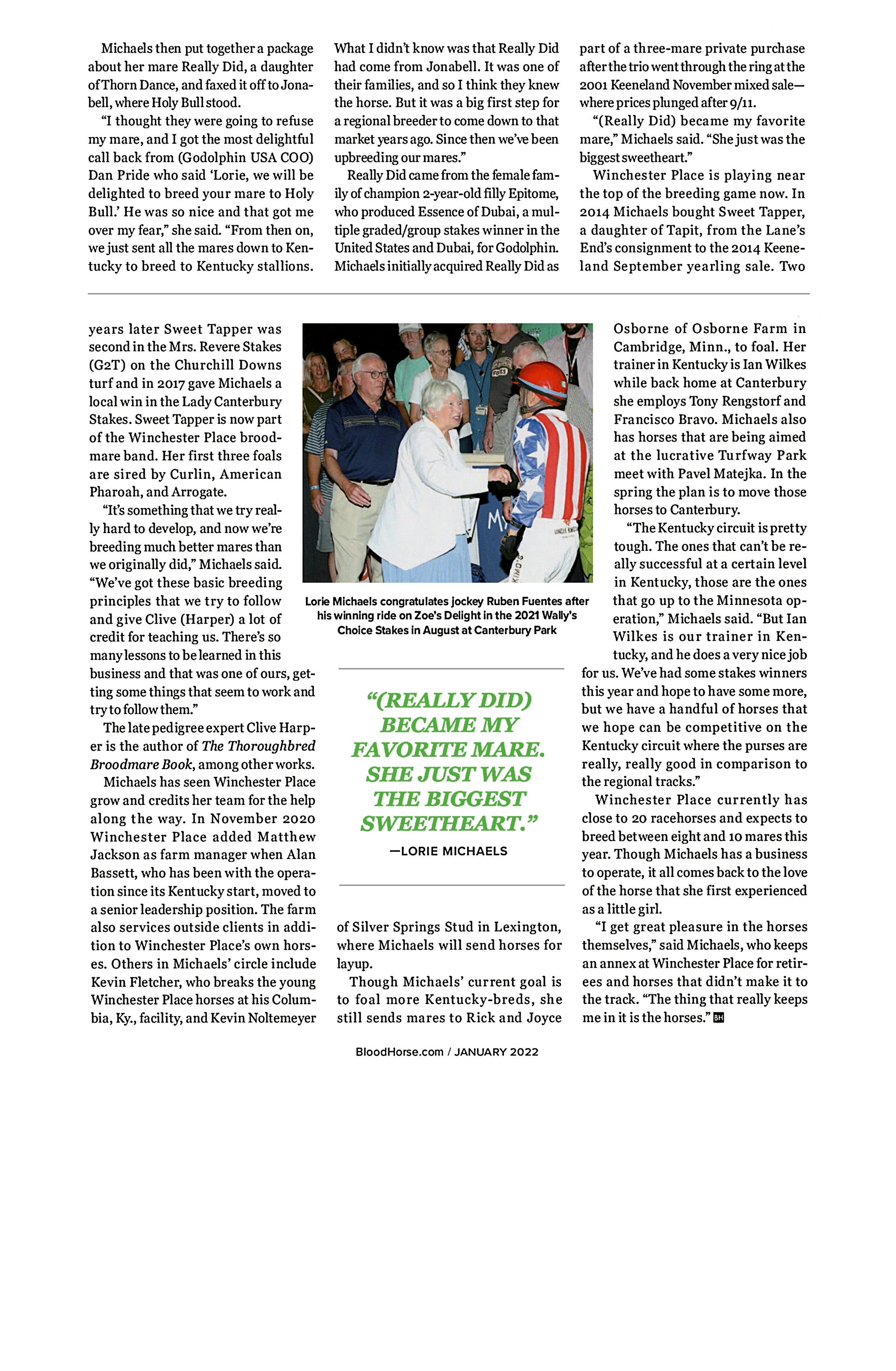The Winchester Place Team
General Manager, Alan Bassett
Alan Bassett is General Manager of Winchester Place Thoroughbreds, LLC. Originally from South Africa, Alan has worked in the horse industry on four continents, including Coolmore’s breeding operations in Ireland and Australia.
Assistant Manager, Miguel Martinez
Miguel Martinez is Assistant Manager. Miguel is a fantastic horseman and has years of experience in the Kentucky horse industry.
The Owner’s Corner
Featured in Thoroughbred Charities of America
Thoroughbred owners all over the country work hard to ensure their horses recieve a proper retirement. This month, Lorie Michaels of Winchester Place Thoroughbreds offers her views on Thoroughbred aftercare.
How many horses are currently in your racing stable? We will have about 25 horses at the tracks for the spring and summer season. Our home base is Minneapolis and so the bulk of our horses will be at Canterbury Park. We use a handful of trainers based at Canterbury: Gary Scherzer, Tony Rengstorf, Francisco Bravo, Eric Heitzmann. Kelly VonHemel has also trained for us and will have a couple of horses at Prairie Meadows and then in Kentucky after that season. Ian Wilkes trains our horses who run the Kentucky circuit and then winter in Florida. If I believed in re-incarnation, I would want to come back as one of Ian’s horses.
What has been your favorite win/moment as an owner? We bought our very first racehorse at the Minnesota Thoroughbred Association Yearling Sale in 2002. A year later, she won her very first start by lots of lengths in a maiden special. We had no idea what was going to happen before the race, but when she came tooling down the stretch all by herself with nobody even close to her, we were jubilant- and hooked! Our most recent success came the day after Thanksgiving when our Tapit filly became graded stakes placed in the Mrs. Revere Stakes (GII) at Churchhill Downs. Ian trains her and he also won that race with another of his fillies. The day after that came McKraken’s big win and the march toward the Kentucky Derby began.
How do you determine when it is time to retire your Thoroughbreds? The horses themselves usually tell you when it is time. If our horses can’t compete and be productive at a certain level, we retired them and they go on to the next phase of their lives. You can tell when they are not happy. We never drop them into the bottom ranks and we never run a horse into the ground.
Once it’s decided that retirement is necessary, how long do you go about determining the most suitable retirement option for your horses? All of the horses that retire from the racetrack get turned out at the farm and buddied up with another horses or two. We want them to just be normal and happy for awhile before we even contemplate where they will go and what they will do. We have developed a friendship with an equestrian from Ohio who does eventing and rides at the very highest levels. She has taken many of our horses and has turned them into Champions. One of our favorite horses, Smart Bob, went to Kara after racing, became a Region 8 Champion, and we eventually bought him back for our 11 year old granddaughter, Finley, who lives in California. Their very first year together they were Pacific Coast Horse Association top age 11 and under duo and came home with a huge bronze trophy. Kara also has students who become end-users of the horses she buys from us. Bobbie Jones is right now preparing one of our former racers for the Off Track Thoroughbred Challenge. I think the show horse enthusiasts are comfortable buying our horses because they know that we don’t run them into the ground, that they have the best care possible, and are kind of temperament. I have this theory that horses reflect the personailities of the people caring for them. We also send horses to South Dakota where my former farm manager, Michael Christiansen, retrains the Thoroughbreds to be western horses. Michael was once the #4 rated reining horse competitor in the state of Utah and a marvelous horse trainer. There are now Thoroughbreds in Minnesota, South Dakota, and Wisconsin who are barrel horses, ranch horses, trail horses, lesson horses, and companion horses. Most of their owners have never had a Thoroughbred before, and they love them. Other horses that were special to us or who are older are not marketable, we just keep them.
What are your thoughts about an owner’s role in Thoroughbred aftercare? When I was 9 years old, I got a little Appaloosa mare named Papoose for my birthday. I loved Papoose and every other horse that followed her. When I got married, my father said to my new husband, “Here is my daughter, and her two horses.” Economies soon sent us looking for a piece of land so I could feed and take care of the horses myself rather than pay the operators at the local fair grounds. For what we were paying others to take care of the horses, my husband figured we could make a downpayment and buy some land. That is what we did. We began investing in farmland, and now, years later, we are very fortunate in that we have a place to care for my horses.
Any horse that I have bred or that I have purchased, I feel responsible for them, and I try to keep track of them. We once sold a yearling at Keeneland who ended her career running badly in cheap claiming races practically every week in Arizona. I contacted the owner/trainer to let him know that she had a home to go to, and all he said was, “If you want her, claim her.” We ended up buying her for $1,100 and shipped her back to Kentucky. After a year of turnout with other horses, she came around and is now a broodmare at a Quarter Horse farm in South Dakota. Others have been claimed from us and we have got them back. It is very difficult to find good homes for horses that are no longer productive or past their prime. I know that our circumstance is ideal and that not every owner has the options that we have, but there are good-hearted owners out there that make the same kind of commitment to their horses that we have made to ours. Thank goodness for organizations like Thoroughbred Charities of America who take care of the multitude of horses needing homes. I am passionate about my horses and have truly loved them since I was 9 years old. It is good to know that there are many others out there, just like me, who will do whatever they can to take care of these wonderful animals.
TCA is proud of Lorie’s responsibility to her horses and proud of the many owners who are dedicated to ensuring a proper retirement for their Thoroughbreds.




